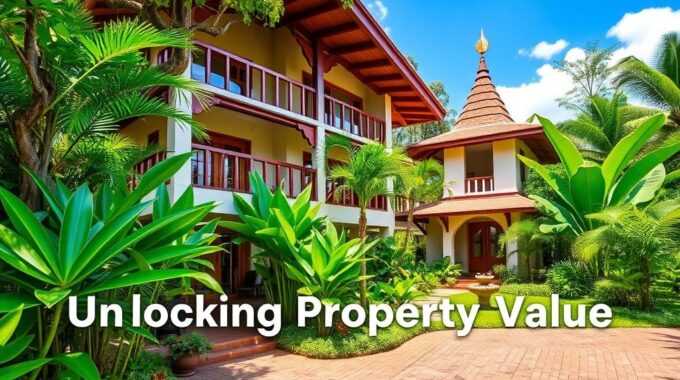GAP Investments provides tailored financing solutions for investors in Costa Rica, understanding the unique needs…

Property Taxes in Costa Rica: A Comprehensive Guide
If you own real estate or a company in Costa Rica, you must know about the annual taxes. Not paying these taxes on time can cause penalties. Plus, there might be a legal process to collect the money owed. It’s smart to get advice from a lawyer to make sure you do everything right. This includes filing the necessary paperwork correctly.
Costa Rica has several taxes that you need to be aware of. These may include things like fees for your company, a solidarity tax, taxes on money made from renting property, and property taxes. You may also come across a Value Added Tax (VAT) and a tax for using the roads.
Key Takeaways
- Property tax in Costa Rica is only 0.25% of the purchase price or assessed value.
- Absentee property owners in Costa Rica who rent their property are required to pay a 15% tax on 85% of their rental income.
- The luxury tax in Costa Rica ranges between 0.25% – 0.55% depending on the home’s value.
- Foreign investors in Costa Rica are required to pay a 3% tax on the assessed value of properties, in addition to other taxes.
- Property owners in Costa Rica have the right to appeal property tax assessments if they believe the assessed value is too high.
Understanding Property Taxes in Costa Rica
Property taxes in Costa Rica depend on the property’s value and are paid yearly. Each local area decides the tax rate. This rate can be anything from 0.25% to 1.5%.
The tax you owe is worked out by a local expert based on your property’s value. This tax is sent straight to the local area where your property is. It needs to be paid before the year ends.
Types of Property Taxes in Costa Rica
Aside from the yearly property tax, there are transfer taxes. These apply when a property changes hands, costing 1% to 5%. There are also chances to get exemptions or deductions on your property taxes.
Calculating Property Tax Obligations
The size of your property tax bill in Costa Rica is based on how much your property is worth. If you don’t pay on time, you may face extra fees. It’s vital to know and follow the local tax rules.
Importance of Staying Compliant
Keeping on top of property tax requirements and deadlines is very important. Not paying on time can bring fines and other problems. Talking to a tax expert can help you understand exemptions, deductions, and tax-saving strategies for property owners.
Annual Corporation Fees
In Costa Rica, every corporation, even inactive ones, must pay annual taxes. These taxes are a percentage of the monthly base salary of a government employee. Right now, this base is 450,200 colones, which is about $790.
Inactive Company Taxes
Inactive companies pay a tax rate of 15% per year. This is based on the monthly base salary, currently 67,530 colones – about $120.
Active Company Tax Rates
Companies making less than 54,024,000 colones a year have a 25% tax rate. This equals to 112,550 colones, around $200 annually. If the revenue is between 54,024,000 and 126,056,000 colones, the tax rate is 30%. This amounts to 135,060 colones, about $235.
For companies earning more than 126,056,000 colones, the tax rate is 50%. They pay 225,100 colones, nearly $390 each year.
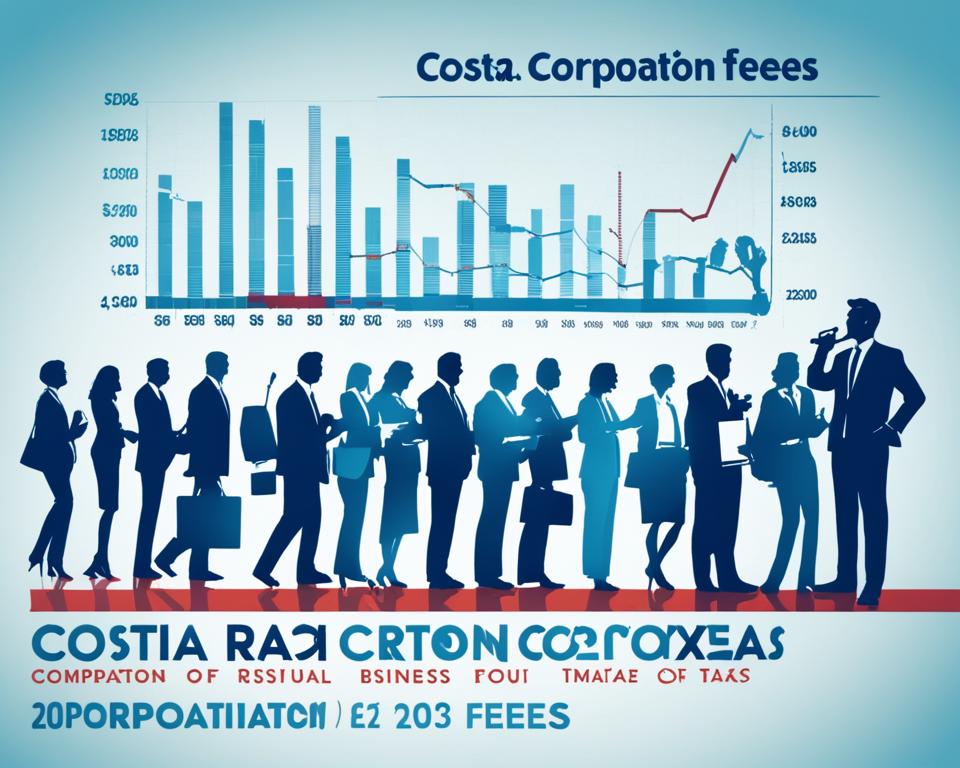
Solidarity Tax: Supporting Housing Programs
Costa Rica puts a “Solidarity Tax” on expensive homes. This tax helps make the country’s housing programs stronger. The tax is on the home’s value and improvements, not its land. In 2023, homes worth more than 133,148,400 colones faced this tax.
Threshold for Solidarity Tax
Costa Rica’s Solidarity Tax covers only the house and improvements, not the land. The limit in 2023 was 133,148,400 colones. If your home is worth more than this, you pay the Solidarity Tax.
Tax Rates and Payment Deadlines
The Solidarity Tax rate in Costa Rica is between 0.25% and 0.55% of your home’s value. It must be paid by January 15th every year. Missing the deadline means you’ll owe more. So, it’s important to stay on top of this tax to help the country’s housing efforts.
Rental Income Tax
If you rent out your place in Costa Rica, you must pay taxes on what you earn. The general rule is, 15% of your rental income is thought to be spent on expenses. So, you get taxed on the remaining 85%. This 85% is taxed at a fixed rate of 15%. It’s called the “15/15 tax.”
Alternative Tax System for Rental Income
Here’s a special rule: if you hire someone to help (like a cleaner), taxes work differently. Then, you can follow “the old way.” This method figures out the tax based on your actual profit after deducting expenses. You pay taxes following a schedule set by tax authorities, and it’s done once a year.
Property Taxes in Costa Rica
In Costa Rica, property taxes are lower than in the U.S. or Canada. They run about 0.25% of the property’s price. You need to get your property’s value checked every five years.
If you don’t, you might face penalties. This could lead the municipality to set the value. At the same time, you pay taxes, you also pay for garbage collection.
| Tax Type | Tax Rate |
|---|---|
| Property Tax | 0.25% – 1.5% of property value |
| Transfer Tax | 1% – 5% of transaction value |
| Luxury Tax | 0.25% – 0.55% of high-value home value |
| Rental Income Tax | 15% of 85% of rental income |
| Corporate Tax (Inactive) | 15% of monthly base salary |
| Corporate Tax (Active) | 15% – 50% of monthly base salary |
Homeowners in Costa Rica can challenge their property tax assessment. Some places give tax breaks for farms or homes of lower-income people. To lower taxes, know the tax laws, go green with your property, and keep an eye on tax changes.
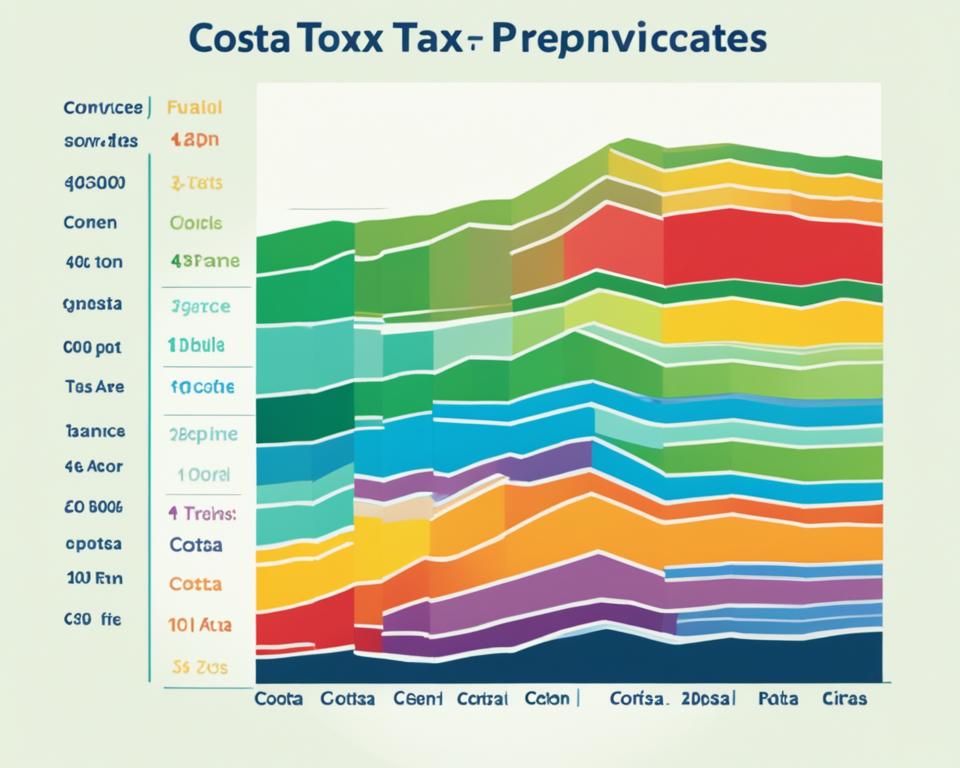
Value-Added Tax (VAT)
In Costa Rica, the Value-Added Tax (VAT) is also called IVA. It’s a 13% tax applied to most things you buy, from goods to services. This includes transactions like costa rica real estate taxes and costa rica property transactions.
| Transaction Type | VAT Rate |
|---|---|
| Goods and Services | 13% |
| Real Estate Transactions | 13% |
| Rental Income | 13% |
| Luxury Goods | Up to 100% |
The IVA is a key part of how Costa Rica collects money. This 13% tax helps pay for things everyone uses, like roads and schools. People who own property or do business there need to remember this tax. They use it to find out their costa rica property tax assessments and other taxes they might owe.

Circulation or Road Tax
In Costa Rica, the Circulation or Road Tax depends on your car’s value. You pay this tax every year. The money goes into keeping and making the roads better in the country.
Vehicle Value-Based Taxation
The Marchamo tax is Costa Rica’s yearly road tax. It’s also for insurance. This tax is due from November 15th to December 31st. The cost is based on your vehicle’s worth. There’s a 10% late fee per month if you don’t pay on time.
Imagine your vehicle costs about ₡20,000,000 (around $35,000 USD). You’d pay about ₡50,000 (or around $90 USD) in Marchamo tax. The more your vehicle is worth, the higher the tax. This extra money helps keep Costa Rica’s roads in good shape.
Shareholder Declaration Requirements
Costa Rica has a new rule. It makes every company in the country share info about its owners, stocks, and who has them. Lawmakers made this rule to keep up with global tax rules and fight tax evasion. Companies need to get a digital signature from a Costa Rican bank to do this online. This is only for Costa Rican residents or people who can legally live in Costa Rica.
Digital Signature for Online Filing
Getting a digital signature matters a lot for companies in Costa Rica. The government requires this special online password. It lets companies send in their info about shareholders. The key point is, only people who live in Costa Rica legally can get this digital signature. This shows how important following all the rules is for businesses there.
Penalties for Non-Compliance
Not telling the government about company owners can be very expensive. The fines start at $2,000 but can go up to about $79,000. The final amount depends on the company’s tax situation. If a company ignores this rule, it can face big problems. It might not be able to do any legal business. Plus, there may be extra fees and even bans on economic activities.

Property Tax Assessments and Appeals
In Costa Rica, officials check property values for tax every now and then. Owners should watch out for these checks to make sure their property is valued fairly. Anyone who thinks their property is valued too high can contest the assessment.
Understanding Property Assessments
The tax system in Costa Rica checks property values for tax needs. This process is very important because it decides how much tax a property owner must pay. It’s key for property owners to know about these checks, the key dates, and any updates to the property tax laws.
Appealing Inaccurate Assessments
Feel your property tax value is wrong? You can challenge it. Getting advice from a tax pro who knows about Costa Rican property is smart. They can help you through the appeal steps. This could lower your tax bill legally.

Transfer Taxes on Property Transactions
Real estate deals in Costa Rica come with extra taxes besides the usual property tax. These extra taxes depend on the property’s value and can be between 1% and 5% of the price.
Buyer’s Responsibilities
The buyer usually pays these transfer taxes. Yet, sometimes, buyers and sellers agree to share this cost. Buyers need to consider these taxes when planning their home purchase in Costa Rica.
Tax Rates for Property Transfers
Here are the detailed rates for these taxes in Costa Rica:
| Tax Type | Tax Rate |
|---|---|
| Property Transfer Tax | 1.5% of the purchase price or property tax value, if higher |
| National Registry Stamp | 0.5% of the transaction value |
| Stamp Duties | 5 colones per 1,000 of the contract value |
These taxes are on top of value-added tax (VAT) or any other related fees. Knowing about all these costs helps buyers plan their property purchase wisely in Costa Rica.
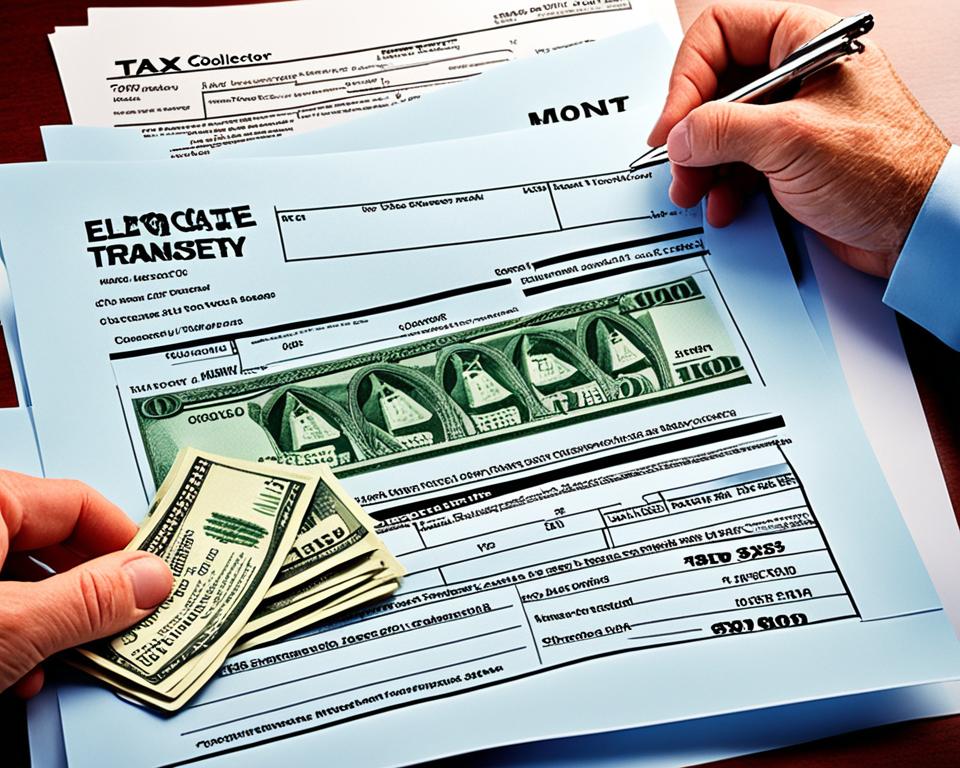
Property Tax Exemptions and Deductions
In Costa Rica, property owners can get tax breaks depending on where they live and their situation. These breaks can save them a lot of money. They help with the high costs of owning property in Costa Rica.
Agricultural Property Exemptions
Costa Rica has tax reductions for farmland and similar properties. If you use your land for farming or raising animals, you might pay less. This is a big help for farmers and others in the agricultural business.
Low-Income Homeowner Deductions
If you don’t earn much money, you could pay fewer property taxes in some places in Costa Rica. This is to ease the financial pressure on families. Being eligible could mean you save money on your home’s taxes.
Moreover, some areas let you lessen your tax bill by deducting part of your mortgage. It’s especially good for new homeowners still paying off their homes.
Knowing the local tax laws and using these benefits is smart for property owners in Costa Rica. Talking to experts can help save a lot of money. They can guide you to all available tax breaks.
Costa Rica’s Property Tax Reform
Recently, Costa Rica made big changes to its property tax system. This affects foreign investors. Now, all foreign investors need to pay a 3% tax on their property’s assessed value. This is true for homes or businesses. Also, they have to pay any transfer taxes when they buy or sell a property.
Implications for Foreign Investors
This reform means foreign investors have more taxes to pay. They now face a 3% tax on their property’s value. This makes owning and managing real estate more expensive. Plus, there’s a 1% tax on the money they earn from renting out properties.
Rental Income Taxation
Costa Rica’s new tax laws also change how rental income is taxed. Foreign investors now pay a 1% tax on what they make from renting. They still have to pay the property’s 3% value tax. Knowing these new rules is crucial for smart investing.
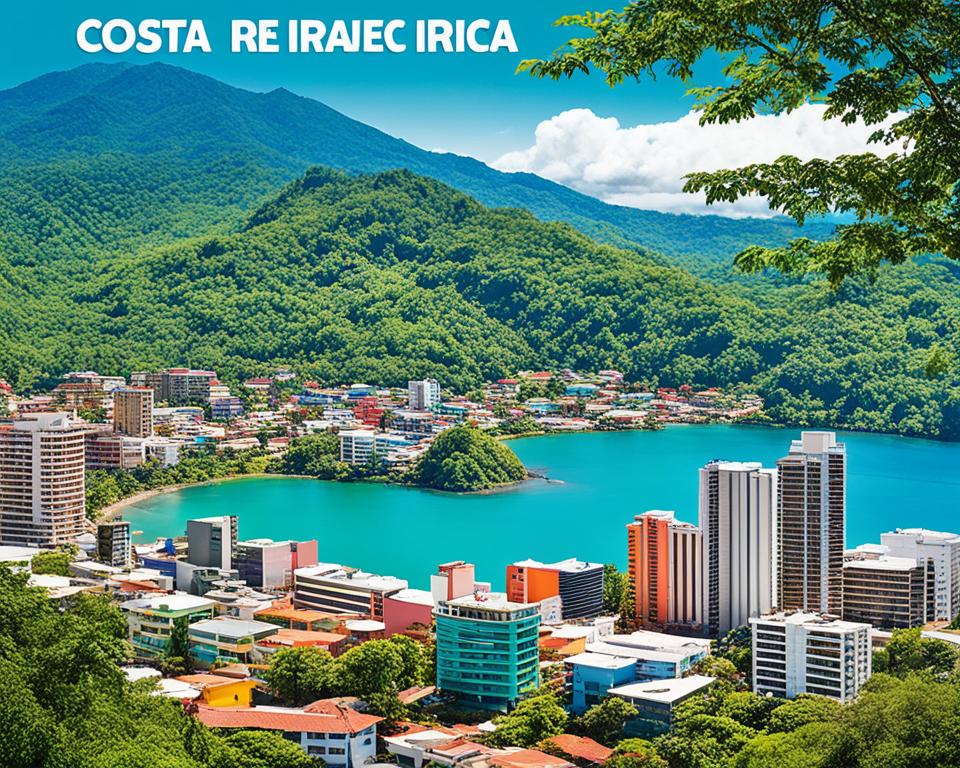
Tax Planning and Minimization Strategies
Property taxes in Costa Rica can be high for investors and owners. There are ways to lower these costs. Knowing the local tax laws and regulations is key. This knowledge allows you to use any available tax cuts.
Understanding Local Tax Laws
Some areas in Costa Rica excuse properties used for farming or owned by those with low incomes. It’s vital for investors to know their property’s location-specific tax laws. This helps them claim all possible deductions or exemptions.
Utilizing Tax Credits and Incentives
Other than deductions and exemptions, investors can benefit from tax credits. These credits apply to green projects that save energy or help the environment. They cut down on property tax costs and other related bills, making property ownership more affordable.
Staying Updated on Tax Changes
Owners and investors need to keep tabs on the tax laws in Costa Rica. Being up to date ensures they wisely use any new tax benefits. It also helps them steer clear of penalties for breaking tax rules.
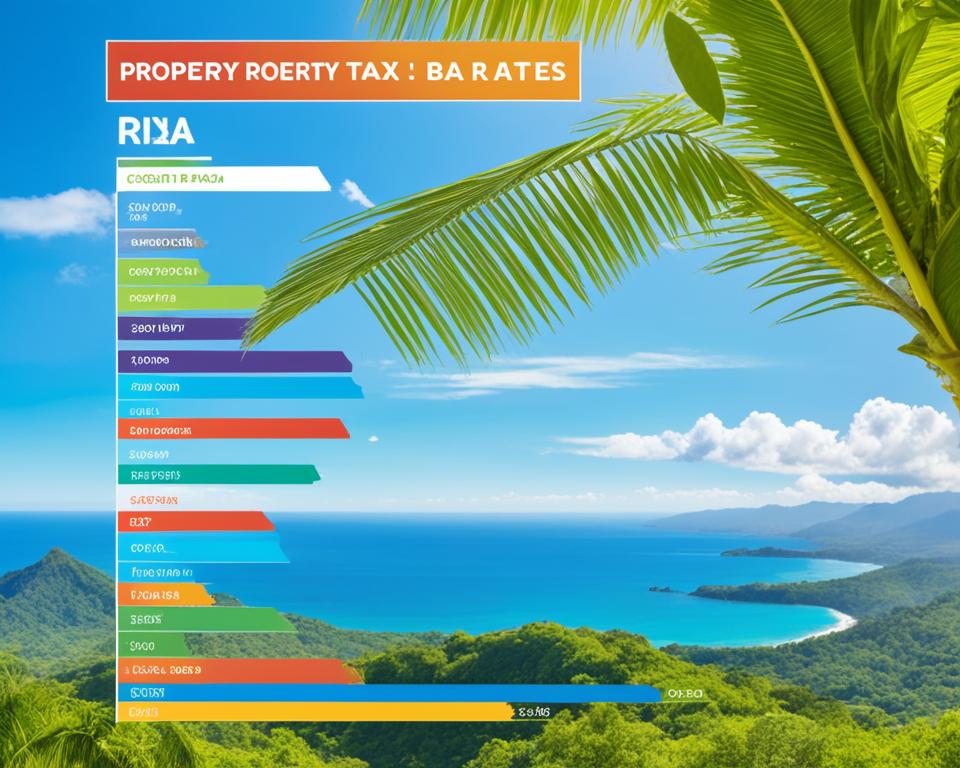
Conclusion
It’s crucial for property owners in Costa Rica to understand and follow the property tax obligations. Not paying property taxes can lead to fines. Seeking advice from a tax expert helps with property tax exemptions and tax-saving strategies. It also keeps you updated on the property tax laws and regulations. This way, property owners can manage their taxes well, making the most of their investments.
Owning property in Costa Rica means facing various taxes and fees. Yet, the tax rates here are lower than in many other places. The property tax rate is just 0.25% of your property’s value. Plus, there are tax exemptions and deductions that can lessen the financial load even more.
By knowing Costa Rica’s property tax system, expat property owners and investors can handle their obligations better. Keeping up with tax rules and planning is key for a good experience in this lively part of Central America.
FAQ
What types of property taxes are levied in Costa Rica?
Costa Rica charges different property taxes. These include Annual Corporation Fees, Solidarity Tax, and others like Rental Income Tax and Value Added Tax (VAT).Circulation or Road Tax are also part of the list.
How are property taxes calculated in Costa Rica?
Property taxes depend on the property’s value. A local assessor figures this out. Tax rates vary from 0.25% to 1.5% and are different in every area.
What are the consequences of not paying property taxes in Costa Rica?
If you don’t pay, you’ll face penalties and collections. It’s crucial to always meet your tax duties.
What is the Solidarity Tax or “luxury tax” in Costa Rica?
The Solidarity Tax supports housing programs. It’s a percentage of a property’s value, mainly for expensive homes. The rate goes from 0.25% to 0.55%, depending on the property’s worth.
How are rental income taxes handled in Costa Rica?
Rental incomes face a flat 15% tax on 85% of the total. Owners with staff can opt for taxes on net income instead.
Are there any property tax exemptions or deductions available in Costa Rica?
Exemptions are available for some properties, like those used for farming. Low-income property owners might also be eligible. Plus, part of mortgage payments can sometimes reduce property tax bills.
What are the requirements for the shareholder declaration in Costa Rica?
Costa Rican companies must report their shareholders and ownership details. This is to follow international tax rules and fight tax dodging.
How can property owners appeal inaccurate property tax assessments in Costa Rica?
If you think your property’s value is off, you can appeal. A tax expert can help you understand the process and offer advice for your case.
Who is responsible for paying transfer taxes when a property is bought or sold in Costa Rica?
Typically, the buyer handles transfer taxes. They are between 1% and 5% of the property’s purchase price. Occasionally, buyers and sellers split this cost.
How has the recent property tax reform in Costa Rica impacted foreign investors?
Foreign investors now face a 3% property tax. This is in addition to transfer taxes. They also pay a 1% tax on their property’s rental income.
Source Links
- https://www.specialplacesofcostarica.com/property-management/costa-rica-taxes/
- https://www.coldwellbankertamarindo.com/article/understanding-property-taxes-in-costa-rica
- https://rebeccaclower.com/costa-rica-living/costa-rica-taxes-101-property-import-income-vat-taxes
- https://www.costarican-american-connection.com/annual-taxes-and-filing-requirements-in-costa-rica
- https://www.livingcostarica.com/costa-rica-real-estate-topics/where-and-how-to-pay-the-costa-rica-corporation-tax/
- https://gaprealestate.com/costa-rica-property-taxes/
- https://smartaccountingcr.com/property-taxes/
- https://greencr.com/tax-requirements-and-compliance-for-vacation-rentals/
- https://www.livingcostarica.com/costa-rica-taxes/all-about-taxes-in-costa-rica/
- https://taxsummaries.pwc.com/costa-rica/corporate/other-taxes
- https://uvitalawfirm.com/shareholders-registry/
- https://greencr.com/how-to-file-the-corporate-owner-disclosure-form-in-costa-rica/
- https://tavik.com/blog-1/discover-the-latest-guide-how-much-are-property-taxes-in-costa-rica-en-cb/
- https://livingcostarica.com/costa-rica-real-estate-topics/faq-property-tax-and-other-taxes-to-pay-when-buying-property-in-costa-rica/
- https://www.ey.com/es_cr/tax/tax-alerts/costa-rica-the-costa-rican-executive-branch-files-comprehensive
- https://nomadcapitalist.com/global-citizen/how-to-pay-zero-or-low-taxes-in-costa/
- https://icsid.worldbank.org/sites/default/files/parties_publications/C3164/Claimants’ Expert Reports and Opinions/140425 FTI ER1 and Exhibits/FTI 28 __www-remax-oceansurf-cr-com.pdf


